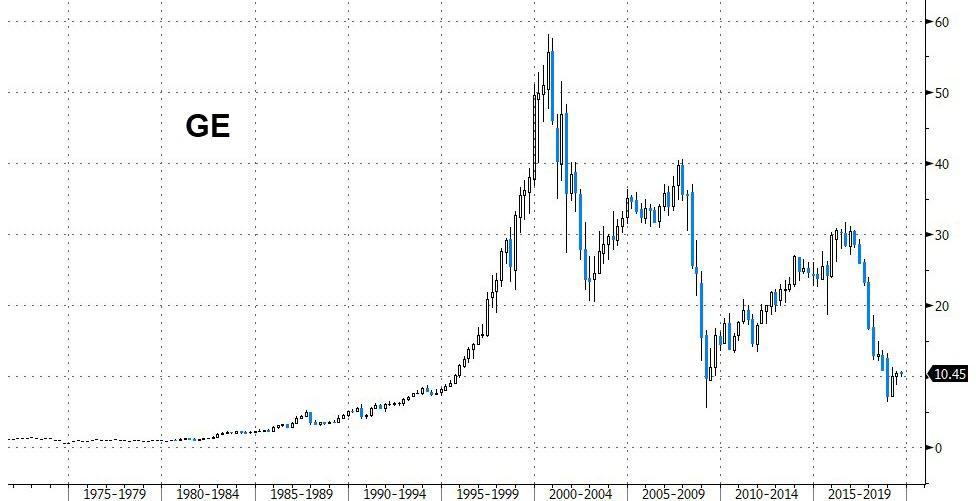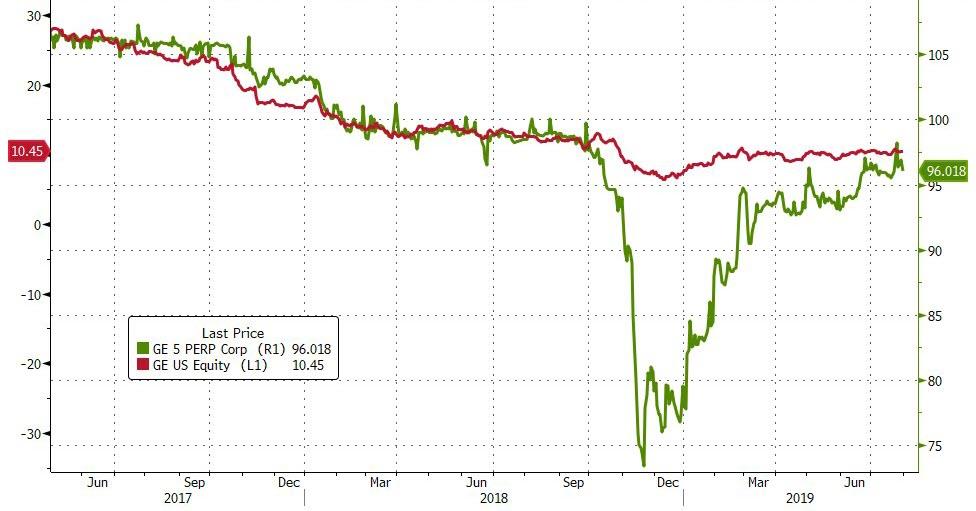Almost Daily Grant’s, submitted by Grant’s Interest Rate Observer
This morning, General Electric reported second quarter results, including $28.8 billion in revenues and 17 cents in earnings per share, down 4% and 6% year-over-year but north of the expected $28.7 billion and 12 cents, respectively. CEO Larry Culp termed the updated outlook “a sign of progress, a sign of stability here.” But those figures were aided by a lower than expected tax rate, and the aviation division saw orders fall 10% from a year ago thanks in part to the Boeing 737 Max saga.
Some analysts were less than impressed, with Stephen Tusa of J.P. Morgan Chase & Co. declaring that “the quarter was a miss operationally, with the combined power/renewable segments worse. . . and a material miss at aviation, the key value driver.” Gordon Haskett Research Advisors’ John Inch summarized the quarter as “a modest step back [relative to] expectations.” Mr. Market agreed, as GE common stock finished slightly lower. Since November 2007, GE shares are down 75%, compared to a 93% rise in the S&P 500 over that period.
It’s been a long, steep fall from grace for America’s former preeminent industrial concern. As early as the Sept. 14, 1990 issue and many times thereafter, Grant’s expressed a bearish view on then-CEO Jack Welch’s commercial pride and joy. That judgement was long flummoxed by GE’s routine one cent quarterly earnings “beats,” a soaring share price and a pristine triple-A credit rating. Following GE’s dramatic near-demise (and subsequent government rescue) during the 2008-era crucible, Grant’s issued the postmortem in the Sept. 18, 2009 edition:
Some day, financial historians will try to make sense of it all: the mere existence of a $100 billion GE commercial paper program (the number today seems incredible); the ideal of “shareholder value” carried to the point of alleged institutionalized fraud; an industrial company recreating itself as a highly and precariously leveraged financial institution with nary a peep of protest from the stockholders; the close brush with insolvency of a company still bearing the imprimatur, triple-A.
Finally, the historians of the future will scratch their heads to understand why Jack Welch and Alan Greenspan, icons of the late 20th century, put so much stock in an idealized “stability” that can only appear to exist in a dynamic world but can never be present in fact.
The company’s well-ventilated post-crisis struggles culminated with the Oct. 30 slashing of its dividend to a mere penny, while credit default swaps reached as high as 268 basis points on Nov. 23. In the Nov. 16, 2018 issue, Grant’s returned to the scene of now triple-B-minus-rated GE in search of value. While the company’s “mind-numbing” complexity, the run-off of its insurance operations and various contingent liabilities argued for a “wide berth” to GE common, the 5% series D perpetual preferred, then trading at 80 cents on the dollar for a 16.2% yield-to-call, offered a compelling risk vs. reward proposition in the sharp analytical judgement of colleague Fabiano Santin.
While the stock has managed only a halting recovery, those preferreds have since flourished, rising to 96 as of yesterday for a yield-to-call of 7.3%.
With that strong price run and generous yield, what might a series D preferred holder do now? A follow-up in the May 3 edition laid out the calculus:
Take a profit and pay the short-term capital-gains tax (which, for an afflicted New York resident, would total 53.5%)? Or stick with CEO Culp and his GE renovation plan, finally paying the long-term capital-gains rate (36.5% for the same overburdened New Yorker)?
With respect to tax advice, both Fabiano Santin, who performed the superb security analysis, and your editor agree that it is better not to live in New York. Fortunately, the self-directed readers of Grant’s have likely already made up their minds on this sensitive point.
via ZeroHedge News https://ift.tt/2Znkp5G Tyler Durden

